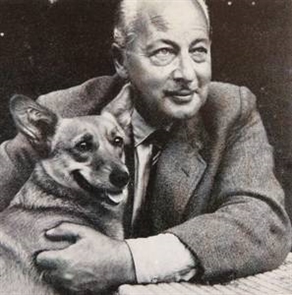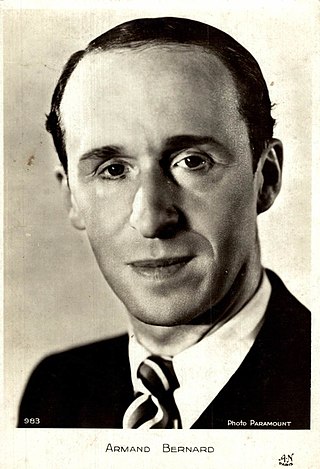Related Research Articles

Wardell Edwin Bond was an American film character actor who appeared in more than 200 films and starred in the NBC television series Wagon Train from 1957 to 1960. Among his best-remembered roles are Bert the cop in Frank Capra's It's a Wonderful Life (1946) and Captain Clayton in John Ford's The Searchers (1956). As a character actor, Bond frequently played cowboys, cops and soldiers.

Streamline Moderne is an international style of Art Deco architecture and design that emerged in the 1930s. Inspired by aerodynamic design, it emphasized curving forms, long horizontal lines, and sometimes nautical elements. In industrial design, it was used in railroad locomotives, telephones, toasters, buses, appliances, and other devices to give the impression of sleekness and modernity.
Farrar & Rinehart (1929–1946) was a United States book publishing company founded in New York. Farrar & Rinehart enjoyed success with both non-fiction and novels, notably, the landmark Rivers of America Series and the first ten books in the Nero Wolfe corpus of Rex Stout. In 1943 the company was recognized with the first Carey-Thomas Award for creative publishing presented by Publishers Weekly.

Leslie Perrins was an English actor who often played villains. After training at RADA, he was on stage from 1922, and in his long career, appeared in well over 60 films.

David Hay Petrie was a Scottish actor noted for playing eccentric characters, among them Quilp in The Old Curiosity Shop (1934), the McLaggen in The Ghost Goes West (1935) and Uncle Pumblechook in Great Expectations (1946).

Willard Robertson was an American actor and writer. He appeared in more than 140 films from 1924 to 1948. He was born in Runnels, Texas and died in Hollywood, California.
The Wisconsin Progressive Party (1934–1946) was a political party that briefly held a dominant role in Wisconsin politics.

Armand Bernard was a French comic actor and composer known mainly for his prolific work in film.
Georges Van Parys was a French composer of film music and operettas. Among his musical influences were the group Les Six, Maurice Ravel, and Claude Debussy. Later in his career he served as vice-president of the Société des auteurs, compositeurs et éditeurs de musique. He is buried in the cemetery at Villiers-sur-Marne.
André Roanne was a French actor. He began his career playing in short films, and acted in 91 films in total, most notably those of Fernandel. Most of his films were French; he did, however, also appear in German and Italian works, especially co-productions with French companies. He also served occasionally as an assistant director, screenwriter, technician, and film editor.

Marguerite Moreno was a French stage and film actress.
Pierre Palau, often known simply as Palau, was a French actor.
Jean Sinoël, often known simply as Sinoël, was a French actor and singer.
Operetta films are a genre of musical films associated with, but not exclusive to, German language cinema. The genre began in the late 1920s, but its roots stretch back into the tradition of nineteenth century Viennese operettas.

István Eiben was a Hungarian cinematographer.
Arne Åkermark (1902–1962) was a Swedish art director who worked on around a hundred and eighty films during a thirty-year career.
Jacques Colombier (1901–1988) was a French art director who designed the sets for many films during his career.
Jules Kruger (1891–1959) was a French cinematographer. He is known particularly for films which he photographed in the 1920s and 1930s for Abel Gance, Marcel L'Herbier, Raymond Bernard, and Julien Duvivier. He also worked in Great Britain and in Spain.
Robert Seller (1889–1967) was a French stage and film actor.
Jean Isnard was a French cinematographer.
References
- ↑ O'Shaughnessy p.238